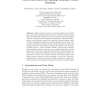Free Online Productivity Tools
i2Speak
i2Symbol
i2OCR
iTex2Img
iWeb2Print
iWeb2Shot
i2Type
iPdf2Split
iPdf2Merge
i2Bopomofo
i2Arabic
i2Style
i2Image
i2PDF
iLatex2Rtf
Sci2ools
GECCO
2004
Springer
2004
Springer
An Evolutionary Autonomous Agent with Visual Cortex and Recurrent Spiking Columnar Neural Network
Spiking neural networks are computationally more powerful than conventional artificial neural networks. Although this fact should make them especially desirable for use in evolutionary autonomous agent research, several factors have limited their application. This work demonstrates an evolutionary agent with a sizeable recurrent spiking neural network containing a biologically motivated columnar visual cortex. This model is instantiated in spiking neural network simulation software and challenged with a dynamic image recognition and memory task. Since the resulting agent or “virtual organism” initially contains many randomly and recurrently connected neurons, we use a genetic algorithm to evolve generations of this brain model that instinctively perform progressively better on the task. Our investigations lay the foundation for further experiments to resolve the question of whether autonomous agents with spiking neural networks can take advantage of the proven theoretical computat...
| Added | 01 Jul 2010 |
| Updated | 01 Jul 2010 |
| Type | Conference |
| Year | 2004 |
| Where | GECCO |
| Authors | Rich Drewes, James B. Maciokas, Sushil J. Louis, Philip H. Goodman |
Comments (0)

